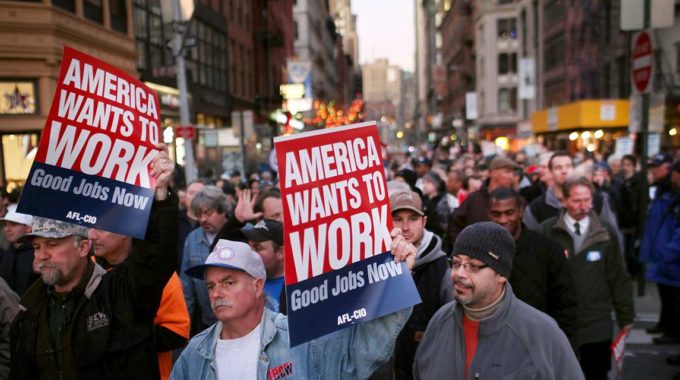Adapted from the writings of Dayan Yitzhak Grossman April 18, 2024 AP News reports: A…

To Form a More Perfect Union
Adapted from the writings of Dayan Yitzhak Grossman
May 13, 2021
Our previous article set forth the basic halachic framework for labor unions: Members of a profession are permitted to regulate their profession for their own economic benefit, but since this may be to the detriment of the public, if there is an “important person” in the city (i.e., someone appointed to oversee public affairs), he must be consulted. R’ Moshe Feinstein assumes (and R’ Shlomo Zalman Auerbach entertains the possibility) that in modern society, there are no such “important people,” and so unions are free to act on their own. In this article, we consider additional halachic perspectives on unions.
R’ Avraham Yitzchak Kook
R’ Avraham Yitzchak Kook is reported to have had a very positive view of labor unions, maintaining that they fulfill the values of tzedek, yosher, and tikkun olam. He adds that they have the right to sue employers and workers who operate outside the framework of organized labor, since such arrangements will typically involve inferior (from labor’s perspective) terms in areas such as wages and hours, and this is likely to have a detrimental effect on the conditions of labor in general. Such claims are to be decided based on da’as Torah applied to the particular situation.[1]
R’ Ben-Zion Meir Hai Uziel
R’ Ben-Zion Meir Hai Uziel, in a 5698 (1938) responsum, explains that the “important person” is one “saturated with the spirit of Torah and justice” who can be “absolutely objective” in weighing the claims of workers against those of employers. He asserts that the requirement of an individual “important person” is merely lahalacha, but lema’aseh, in the current labor economy, an individual “important person” is incapable of filling the requisite role. Instead, an “important bais din,” comprising both those knowledgeable in Torah law and men of science, knowledgeable in economics and social conditions, should be established to enact labor legislation, and dedicated judges should be appointed to resolve labor disputes on the basis of this legislation.[2]
The Tzitz Eliezer
In 5705 (1945), R’ Eliezer Yehuda Waldenberg was asked about the legitimacy of employees striking in order to compel an employer to abide by generally accepted norms such as an eight-hour workday. Rav Waldenberg responds with a comprehensive survey of the Gemara and Rishonim discussed in our previous article (along with many others), in the course of which he concludes that labor organizations do have the right to regulate their professions, but only with the participation of the municipal “important person.”[3] R’ Eliezer Melamed understands Rav Waldenberg to disagree with R’ Moshe and require rabbinic endorsement as a condition for a labor strike even in contemporary times.[4] (He also understands R’ Shlomo Zalman and R’ Chaim David Halevi to apparently hold this way as well, but as we noted in the previous article, R’ Shlomo Zalman explicitly acknowledges the possibility that “in those places where the municipal rabbis and Torah scholars do not involve themselves in the affairs of workers and the wages of labor, it is as though there is no chever ir there.”)
Strikebreakers
Contemporary halachic authorities discuss whether a striking union has the right to prevent strikebreaking.
R’ Moshe rules that a union may decide to strike by majority rule and bar even an unwilling minority from working. With regard to non-union workers, he inclines toward the view that while on the one hand, a union’s authority does not extend to workers who are not members of the union, on the other hand, such non-union workers are nevertheless prohibited from taking the jobs of the strikers under the rules of improper competition.[5] Elsewhere, however, he rules that the use of force against strikebreakers is prohibited, and even the endorsement of the “important person” is insufficient to justify this.[6] R’ Yehuda Zoldan considers this obvious, although it does not seem entirely self-evident to this author, because insofar as we assume that organized labor has the halachic right to impose its will upon unwilling workers, it would seem that even the use of force to enforce this right could be justified under the principle that “a man may take justice into his own hands (avid inish dina lenafshei).”[7]
R’ Shlomo Zalman rules that a majority of workers (with the endorsement of the “important person”) who decide to strike have the right to forcibly prevent other workers, even those from other cities, from taking their jobs. Similarly, Rav Waldenberg rules that workers or their organization have the authority to prevent other workers from taking the jobs of striking workers. (Neither directly addresses the question of the authority of a union over non-union workers.)
The Chazon Ish, on the other hand, rules that striking workers have no right to block others from taking their jobs, and he declares that bais din is obligated to prevent such an injustice if it has the power to do so,[8] but he is discussing individual workers doing so on their own initiative, and not a decision taken by organized labor.[9]
[1]Cited in R’ Yehuda Zoldan, Hisagdus Miktzo’is Vehachrazas Shevisah. Rav Zoldan’s article is a comprehensive discussion of this entire topic.
[2]Shu”t Mishpetei Uziel cheilek 3 / krach 4 C.M. siman 42 she’eilah 6.
[3]Shu”t Tzitz Eliezer cheilek 2 siman 23.
[4]Hilchos Talmud Torah Shiur Mispar 8: Shevisas Poalim Umelamdim.
[5]Shu”t Igros Moshe C.M. cheilek 1 siman 59 s.v. Velachein.
[6]Ibid. siman 58 s.v. Aval vadai.





